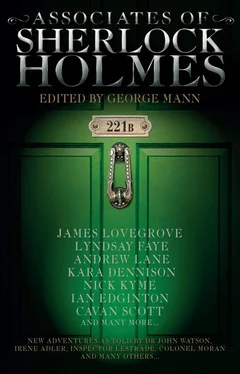We began to make our way up the steps when East purposefully put himself between us and the building.
“About that,” East continued. “You are aware that given his condition, whatever the professor might disclose, it cannot in any way, shape or form be construed as an admission of guilt or used as evidence of any kind?”
“Yes, of course!” exclaimed Holmes and, pointing his cane forwards like a divining rod, marched boldly inside the building. “Your secrets are safe with us.”
East scurried after him. “This way, gentlemen,” said the flustered physician, leading us down a wide, wood-panelled corridor.
I quickly stepped into pace alongside Holmes. “I didn’t know Mycroft sent a telegram?”
“He didn’t,” he replied, flashing a quick smile. “But I dare say he would’ve done if I’d asked. Sometimes the mere mention of his name is enough to open doors.”
I stifled a burst of laughter, prompting East to cast me a scowl over this shoulder.
“Holmes,” I began, “I’m sorry about what happened earlier. Whether rightly or wrongly, I took offence at an ages-old incident without taking into consideration how much richer my life has been for knowing you.”
“The feeling is mutual,” Holmes replied. “After all, I’ve done considerably worse things to you and we have still remained civil.”
“Such as?”
“Letting you think I’d died and returning out of the blue some years later?”
“There is that.”
We followed Dr East down one corridor after another, passing several stern-faced members of staff clad in spotless white uniforms. I noticed a brief flicker of curiosity as they caught sight of us. It appeared that visitors were not a common occurrence.
East asked us to wait as he went to speak to an attendant leaving one of the rooms. There was a sign baring Professor Shawcross’s name on the door.
“This is a house of secrets and no mistake,” said Baynes. “And that young fellow is the keeper of the keys.”
“You suspect something is askance, Inspector?”
“Nothing I can put my finger on, but I have heard of more than one case where an elderly or infirm relative has been committed in order to free up an inheritance. A place like this with its locks and whispers could well facilitate such a practice.”
Dr East returned to us, smiling. I did not take that as a good sign.
“My apologies, gentlemen, but Professor Shawcross has been given his medication a little early today. I afraid he won’t be in a fit condition to answer any questions.”
Holmes gave the doctor a thin, humourless smile. “That is indeed inconvenient. Tell me, Doctor, how long is it before the medication takes full effect?”
“Ten… perhaps fifteen minutes given he’s just eaten.” East replied with some caution.
“And it was administered when?”
“No more than five minutes ago.”
I could sense East’s growing agitation.
“Then we may proceed as planned. We need only five minutes of his time and we shall be on our way.” Holmes walked briskly past the bemused attendant. “Come gentlemen, tempus fugit .”
He ushered me and Baynes inside before turning to block East’s admission.
“I really should be in attendance…”
“There’s no need. We would hate to be a drain upon your time, and Dr Watson is a most eminent physician. If we encounter any problems, you and your staff are just on the other side of this door.”
Holmes stepped inside.
“I shall be sure to tell my brother of your most obliging cooperation. I’m certain he will be interested to know how well this institution is being managed.”
Holmes shut the door and permitted himself a short sigh of relief. “That will have given him something to think about,” he remarked. “If the good inspector is correct, the last thing Dr East will want is the authorities taking an interest in this place. Now, we have little time and much to do!”
The room was cordoned off down one side by steel bars running floor to ceiling. Beyond this artificial annex there was what appeared to be a very compact yet comfortable bachelor’s apartment.
On our side was a desk bearing a pair of white enamel surgical dishes. One contained the remains of a snapped glass vial and a spent syringe while the other had several more but unopened. I picked up the broken vial.
“Holmes, we may have less time than you imagine. This is a potent sedative. It has even been proscribed in some hospitals for its potentially deleterious effects. They clearly intended to have the professor too incapacitated to speak to us.”
“Thank you, Watson. Nevertheless, we must do what we can.”
“Hello? Can I help you?” Professor Shawcross, who had been reading in an armchair, rose to greet us. He was easily six feet tall and broad across the shoulders. He’d possibly been an athlete in his youth, a rower perhaps? His hair was thinning but close cut at the sides and back. His cheeks were heavily pock-marked, suggesting a brush with the measles or chicken-pox.
“Professor Shawcross, my name is Sherlock Holmes. This is Dr Watson and Inspector Baynes of the Surry Constabulary.”
“Surrey…” Shawcross interceded. “You’ve found Peter?”
“Yes, sir, two days ago,” replied Baynes. “We found his body just outside Mortlake.”
“I didn’t kill him, you know.”
“Yes, sir,” said Baynes. “It’s looking more like an accidental death. That area can be marshy and treacherous, especially at night. The ground may seem firm enough but it’s easy to put a foot wrong. He wouldn’t be the first poor soul to lose his life in such circumstances.”
Shawcross fixed the inspector with an intense stare. “I said I did not kill him, but that does not mean it was an accident. He played the tune and paid the piper… with his life. As we all must in our turn.”
“And the piper is?” enquired Holmes.
“Why, death, of course.” Shawcross blinked and looked around perplexed, as if rousing from a fugue state. “Please excuse me. My medicine is taking its toll. I’m afraid I will shortly be of scant use. What is it you wish to know?”
“Everything. Omit nothing, no matter how trivial,” said Holmes.
“Yes, of course, it would be my pleasure,” replied Shawcross, lowering himself into the armchair again. “So, where to begin?”
“Perhaps with the excavation?” prompted Holmes.
“Quite so. As you may or may not know, I was formerly Associate Head of the department of Anglo-Saxon history at the British Museum. In March of 1881, I and several of my associates commenced an archaeological dig close to the village of Mortlake. You see, in the ninth century, England was sorely afflicted by attacks from Scandinavian Vikings. Surrey’s inland position saw it go largely unmolested until a large invasion force of Danes, some ten thousand strong, made their way up the Thames. They had already sacked Canterbury, then London, and defeated King Beorhtwulf of Mercia in battle. The West Saxon army led by King Aethelwulf rose to meet them, but the odds did not bode well. This was a hardened, battle-seasoned foe they faced.”
“And what happened?” asked Baynes, obviously intrigued.
“The Danes were defeated at the Battle of Aclea. Routed, slaughtered. Thousands of the fiercest warriors the world had ever seen.”
“How’s that possible?” I asked.
“Perhaps a combination of tactics and knowledge of the terrain?” said Holmes.
“Or something else?” added Shawcross. “Legend has it that before the battle King Aethelwulf sought the council of a tribe of cunning women. Witches, shamans, call them what you will. Their arcane practices were being scoured from the land by the one true god, but the King offered them amnesty if they would aide him in his darkest hour. And aid him they did. They summoned the angel of death itself to walk in the vanguard, playing a pipe whittled from the bones of the first human. The King’s men were bade to avert their faces and stopper their ears so as not to see or hear it.”
Читать дальше












